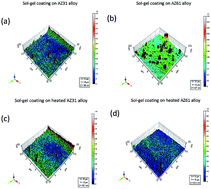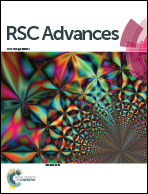Effect of heat treatment of magnesium alloy substrates on corrosion resistance of a hybrid organic–inorganic sol–gel film
Abstract
The influence of heat treatment of magnesium alloy substrates on corrosion resistance of a sol–gel coating has been assessed during immersion tests in 0.6 M NaCl aqueous solution. Relative differences in the chemical nature of the layers were quantified by scanning electron microscopy (SEM) and energy dispersive analysis of X-ray (EDX). Corrosion behaviour was evaluated by Electrochemical Impedance Spectroscopy (EIS) and hydrogen evolution measurement. Long-term immersion testing show that the sol–gel/heat treated AZ61 substrate exhibits a superior anti-corrosion property in comparison with the sol–gel/non-heated substrate. In contrast, no significant changes have been observed between the heated and non-heated samples in the case of the sol–gel coated AZ31 substrates. A link was found between lower O/Si atomic ratios observed by EDX analysis on the sol–gel coatings after the preparation process and reduced corrosion upon the coated substrates. Heat-treatment increased the protective properties of the passive film on the surface of the AZ61 substrate and hence inhibited magnesium dissolution and hydrophilic group formation during coating preparation.



 Please wait while we load your content...
Please wait while we load your content...